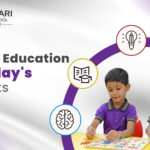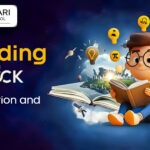Table of Contents
Introduction
As the world around us continues to evolve rapidly, so must the way we educate our children. At Godavari Public School, Nashik, we prepare our students for a future that involves more than academic excellence.
We focus on nurturing 21st Century Life Skills in students. These are the crucial skills that empower individuals to adapt to change, solve problems, communicate effectively, and lead with confidence in a complex world, ensuring they thrive in the 21st century.
Guided by the CBSE curriculum and a commitment to progressive education, our learning environment is designed to develop well-rounded individuals capable of adapting to modern challenges, thinking critically, and engaging meaningfully with the world around them.
Through this commitment, we empower our students with essential 21st Century Life Skills that enhance their personal and academic growth, preparing them for success in the 21st Century Life Skills.
This blog explores how we integrate 21st Century Life Skills into our teaching practices at our school and why this approach is vital in today’s educational landscape to equip students for the modern world.
Understanding 21st Century Life Skills
21st century life skills refer to a broad set of competencies that support personal and professional success in the modern world. These skills extend beyond academics and are crucial for lifelong learning, social responsibility, and global citizenship.
Some of the key life skills we focus on at Godavari include:
> Critical and creative thinking
> Effective communication
> Collaboration and teamwork
> Digital literacy
> Emotional intelligence and self-awareness
> Adaptability and resilience
> Problem-solving and decision-making
By nurturing these abilities early, we help our students develop the mindset and flexibility needed to thrive in diverse environments, be it higher education, the workplace, or the community.
◻ The Role of the CBSE Curriculum
The CBSE curriculum supports the development of life skills through its emphasis on conceptual understanding, co-scholastic development, and skill-based learning. It encourages inquiry, active participation, and a balanced approach to academics and extracurricular activities.
At Godavari Public School in Nashik, we align closely with CBSE’s goals while building on its foundation through:
> Integrated lesson planning that links classroom topics to real-life scenarios.
> Project-based learning that promotes research, creativity, and collaboration.
> Continuous and Comprehensive Evaluation (CCE) to assess both academic and personal growth.
> Co-curricular programs that encourage communication, leadership, and teamwork.
This structured approach ensures that life skills are not treated as add-ons but as an essential part of everyday learning.

◻ A Progressive Approach to Teaching and Learning
Our commitment to progressive education means we value each student’s unique learning journey. We adopt a child-centered pedagogy that encourages active engagement, exploration, and reflection.
At Godavari, classrooms are dynamic spaces where students are:
> Encouraged to ask questions and think critically.
> Exposed to interdisciplinary learning, connecting subjects with real-world applications.
> Involved in hands-on activities that reinforce understanding through experience.
> Supported by technology to develop digital skills and research capabilities.
This approach cultivates independent learners who are confident in their abilities and open to continuous improvement. It also ensures that students remain engaged and motivated as they progress through their academic years.
◻ Skill Development Beyond Academics
We understand that life skills cannot be developed through textbooks alone. Therefore, we offer a range of programs and platforms where students can practice and enhance these skills in meaningful ways.
1. Leadership Opportunities
From class monitors to student councils, we provide students with the opportunity to lead and collaborate, helping them develop responsibility, empathy, and decision-making skills.
2. Clubs and Competitions
Participation in clubs, such as debate, robotics, environment, or performing arts, allows students to build creativity, confidence, and teamwork in areas that interest them.
3. Digital Learning Programs
Our curriculum integrates digital tools and online platforms that promote digital literacy, research skills, and responsible technology use, essential in a connected world.
4. Sports and Physical Education
Physical activity plays a crucial role in developing focus, discipline, and teamwork. Through sports and structured physical education, students learn perseverance and resilience.
5. Social Awareness & Community Service
We encourage students to engage in community initiatives and awareness campaigns. These experiences help them understand social responsibility, cultural sensitivity, and the value of giving back.

◻ Emotional and Social Learning
In addition to cognitive growth, we prioritise the emotional and social well-being of every student.
Emotional intelligence, such as knowing how to manage stress, communicate feelings, and show empathy, is a life skill that benefits students far beyond school.
Through activities such as guided reflections, value-based lessons, and counseling support, we help students:
> Develop self-awareness and confidence.
> Build healthy relationships with peers and teachers.
> Practice positive communication and conflict resolution.
> Become more empathetic and inclusive individuals.
These skills are essential for creating not just good students, but thoughtful and balanced human beings.
◻ Preparing Life-Ready Learners
Our vision at Godavari Public School is to develop life-ready learners who leave school equipped not only with academic knowledge but also the confidence and capability to face the real world.
What does a life-ready learner look like?
✔ They can adapt to change and work collaboratively.
✔ They approach problems with curiosity and creativity.
✔ They make decisions thoughtfully and communicate with clarity.
✔ They are socially responsible, emotionally grounded, and willing to learn continuously.
Every aspect of our curriculum, from lesson design to extracurricular activities, supports this goal. We believe that education is successful when it empowers students to take ownership of their learning and their lives.
FAQs
Que: 1. What are 21st-century life skills?
Ans: They include critical thinking, communication, collaboration, creativity, digital literacy, and emotional intelligence – skills needed to thrive in today’s world.
Que: 2. Why are these skills important for students?
Ans: They prepare students to adapt, solve problems, and lead with confidence in real-life situations.
Que: 3. How does Godavari teach these skills?
Ans: We blend them into daily lessons, projects, activities, and student-led programs across all grades.
Que: 4. Are life skills part of the CBSE curriculum?
Ans: Yes, CBSE promotes holistic education, and life skills are a core part of our competency-based approach.
Que: 5. What tools or methods are used in classrooms?
Ans: We use group tasks, debates, tech tools, presentations, and real-world challenges to build skills naturally.
Que: 6. How are soft skills like confidence and teamwork developed?
Ans: Through stage exposure, student leadership roles, clubs, and collaborative projects.



